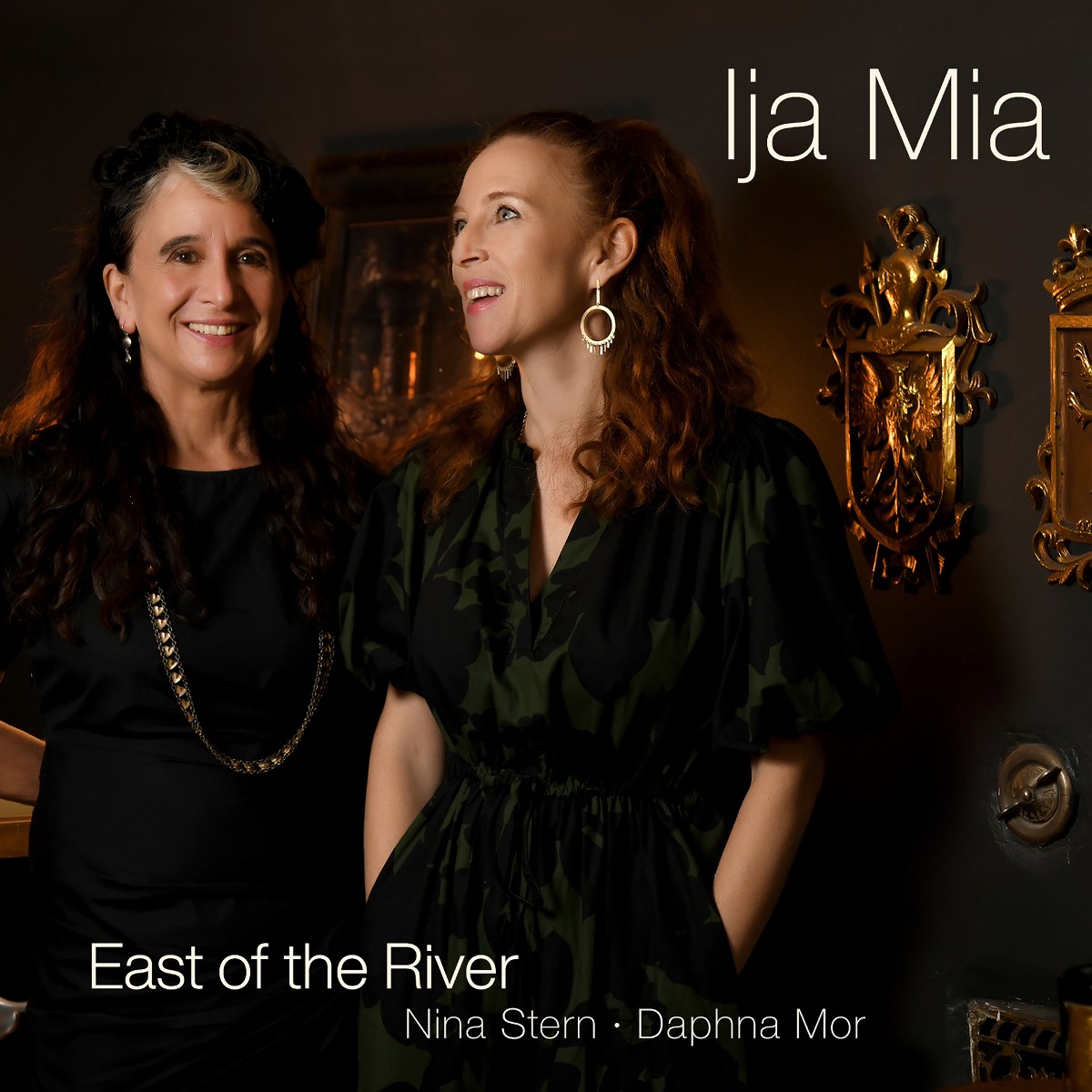April 4, 2024
East of the River
An interview of John Thiessen with Nina Stern and Daphna Mor
 JOHN: When I first listened to pre-mastered tracks from East of the River’s December 2021 recording Ija Mia (My Daughter), I was astonished by the beauty of the melodies, the fluidity and artistic freedom in the performances, and a sense that East of the River has accomplished something remarkable with this intimate, intricate and multi-layered repertoire. I invited Nina Stern and Daphna Mor, co-directors of the ensemble, to discuss their recording as well as plans for its release on April 19 on AVIE Records. Nina and Daphna, let’s go back to the beginning. How did this project come about and how does it relate to your musical and personal journeys?
JOHN: When I first listened to pre-mastered tracks from East of the River’s December 2021 recording Ija Mia (My Daughter), I was astonished by the beauty of the melodies, the fluidity and artistic freedom in the performances, and a sense that East of the River has accomplished something remarkable with this intimate, intricate and multi-layered repertoire. I invited Nina Stern and Daphna Mor, co-directors of the ensemble, to discuss their recording as well as plans for its release on April 19 on AVIE Records. Nina and Daphna, let’s go back to the beginning. How did this project come about and how does it relate to your musical and personal journeys?
NINA: I had been looking at non-Western music from all over the world which would appeal to children (for my work in education) and came to especially love Armenian, Eastern European, and Arabic music. At the same time, Daphna and I began exploring that repertoire together in our own performing careers. That is how East of the River was born. When we began looking at Sephardic music, we found similarities to the Armenian repertoire — gorgeous melodies with twists that sear the heart. The music also spoke to me personally because of my Jewish family’s Venetian roots.
DAPHNA: This recording was a natural evolution for East of the River — as we explore Western and non-Western traditions and their meeting points in form, rhythmic content, and modal origins. Much of the music can appear simple on the page; the performance comes to life through arrangement and improvisation by the ensemble.
JOHN: Ija Mia features liturgical and secular Sephardic repertoire as well as Ottoman music. Tell us about the historical sources and performance traditions, and the artistic decisions East of the River made for the recording.
DAPHNA: The sacred music would have been sung in the synagogues a cappella by men, and in the home, by women and children. The liturgical poetry in this album is old, biblical and 9th–13th century, but the melodies, from the various communities in the diaspora, came much later. The folk music is an oral tradition frequently passed down by women, and is sung on our recording in Hebrew and Ladino. My grandmother is from the last generation of fluent Ladino speakers and it’s important to me to sing in this language as a way of preserving it as well as giving a new interpretation to this tradition. The Ottoman classical music is a gorgeous separate genre, based on a complex system of modes (Maqam) and various length rhythm patterns (Usul), including 32/8 time!
JOHN: Fundamental to the layered richness in the Ija Mia recording is a fascinating mix of instruments performed by virtuosos from different musical traditions.
NINA: East of the River musicians are steeped in jazz, folk, and classical traditions. We infuse the music with our sounds, arrangements, and interpretations. Our approach is to maintain this music as a living tradition, with our own unique collective voice.
Daphna and I both play recorders on the album. She is also featured as a vocalist on many of the tracks and my chalumeau makes an appearance as well. The oud is used throughout and is played by world-renowned musician Ara Dinkjian. Our percussionist is founding Silk Road member Shane Shanahan, our bassist is the phenomenal young Israeli musician, Tal Mashiach, and Palestinian multi-instrumentalist Zafer Tawil plays qanún, violin, and other percussion.
JOHN: You recorded during the pandemic. Tell us about the sessions.
DAPHNA: It happened during a time when we could finally meet together in a studio, unmasked, for three days. The team brought its best — joy and deep connection. We recorded at Reservoir Studio in New York with engineer and producer Ale Roubini, who was joined by fellow engineer Thom Beemer. The final tracks were mastered by Fred Kevorkian.
JOHN: The recording credits note “[p]artial funding gratefully received from Gotham Early Music Scene”. How important was our support for the realization of this project?
NINA: It was essential. Gene Murrow contacted us and other New York early music ensembles in 2021 asking for grant proposals. Funds had been made available to GEMS through the federal Shuttered Venues Operators Grant program, part of the American Recovery Act.
DAPHNA: The financial support from GEMS allowed us to realize the dream of making this recording.
JOHN: The other part of the story came later when East of the River was looking for a label for international distribution. At that point, GEMS was able to bring you together with AVIE Records from the United Kingdom. We are so thrilled that Ija Mia will be the first of a series of GEMS recordings on the label.
DAPHNA: We are as well. Together with GEMS and AVIE, we now are part of a new and exciting collaboration and opportunity. We are very grateful for that.
JOHN: East of the River has a CD release concert on April 11th at 7:30 pm at the B'nai Jeshurun Synagogue on West 88th Street. Why did you choose that particular synagogue to celebrate this happy occasion?
NINA: B’nai Jeshurun is an important center for the arts in New York and it is also a place with an emphasis on interfaith, peace and social justice.
DAPHNA: It is also one of the most gorgeous sanctuaries, decorated in a Moorish style, and appropriate to the occasion. In addition to our live audience, Bnai Jeshurun also offers a state-of-the-art multi-camera live stream of the concert; tickets can be purchased for either, along with donations in multiples of 18, which is a custom in Jewish culture as 18 represents numerically the word Chai which means Life.
JOHN: What can the audience expect to hear on April 11th? Will it be the same as the recording?
NINA: In the performance, musicians will be encouraged to play as long as they want, so the same pieces will be heard, but in an extended way.
DAPHNA: There will be lots of improvisation, which is a core element of this repertoire.
JOHN: You’ve said that the nature of the repertoire and the fact that it can be amplified opens the door wide for different kinds of venues.
NINA: We can perform this in a great variety of venues — anywhere from Joe’s Pub or Drom to traditional chamber series, universities, and synagogues.
DAPHNA: This repertoire can fit in a large concert hall or an intimate setting — folk, ritual music, formal, or informal. On May 10, we will play in a festival called Kuma in Greenpoint, Brooklyn. The presenting organization is centered around social justice.
JOHN: GEMS is so pleased to be on this journey together with East of the River. Ija Mia is an important project musically, historically, and socially, and we invite everyone to attend your concert on April 11 and to purchase a CD!
April 11 performance information & tickets
The album will have its full digital release on April 19. Pre-save or pre-order the album here
Listen to a single from Ija Mia below or on your favorite streaming platform.
View the trailer:



